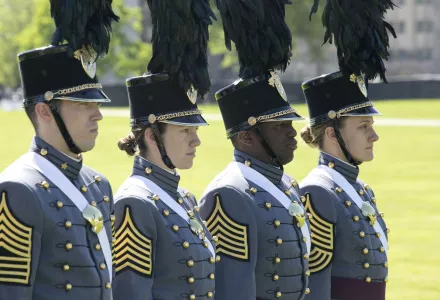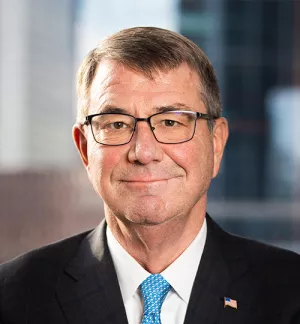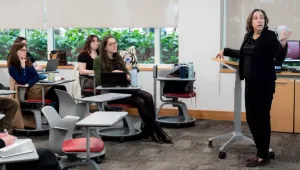
In a country worried about its own internal divisions, public figures are increasingly calling for a return of the military draft, or at least some kind of mandatory national service. Wouldn’t it be good, they often reason, to reinforce for today’s young people the sense of common cause that animated the Greatest Generation? Universal service is a commendable effort to deepen citizenship that should appeal to all Americans. But a closer look at these ideas suggests deep flaws.
The math of military conscription is illustrative.
Every year, about 4 million Americans turn 18. But the military needs to recruit only 250,000 per year. While registration is fine, as secretary of Defense I wanted to pick the troops, not have them picked for me. That was a key reason why I opened all military positions to qualified women without exception. And it’s why I opposed reinstating the draft. The U.S. military is the finest fighting force the world has ever known because of the quality of those who serve. The sad fact is that only about half of the country’s 18-year-olds meet the minimum physical fitness requirements for military service. Many others fail to meet mental fitness standards, such as holding a high school diploma. Single parents aren’t allowed to serve. Neither are most people with a criminal history, evidence of drug use or visible tattoos.
Thus only a fraction of young Americans meet today’s standards for military service, which is why a random lottery or a draft-based selection would be unacceptable ways to fill the military’s ranks.
Yet the potential benefits of exposing more young Americans to the rigors of military service are undeniable. At basic training, drill instructors begin by taking smartphones away from recruits and mailing them home to their parents. Together with other tough discipline, this works wonders: Perhaps for the first time in years, recruits pick up their chins, look someone in the eye and speak clearly, rather than mumbling into the palm of their hand. All this is good for young people. And employers increasingly recognize the value of military training. Veterans are known to make excellent employees because of their discipline and reliability, leadership skills and good conduct.
In light of this proven model, observers who understand that a military draft isn’t feasible still wonder why we can’t develop some other form of universal public service for young people. Surely our country’s young men and women can be enlisted in meaningful work that helps their fellow citizens and builds critical life skills?
It may seem like a no-brainer, but the logistics are prohibitive. Much of the value of this type of service comes from doing it together with peers. But that means housing, feeding and overseeing groups that add up to 4 million young people — a corps hundreds of times larger than Teach for America or the Peace Corps. Vast numbers of barracks would need to be built and staffed with trained chaperones.
And what do advocates propose that these millions of young people do all day? They could, in theory, be put to work rebuilding our infrastructure — but that would affect construction workers and their families. Similar problems would arise if those in national service were assigned to teaching, social work or other skilled jobs. And if they’re going to do entry-level jobs in regular businesses, then it’s not clear how “national service” differs from ordinary work.
What the country needs, then, is not necessarily a massive national program, but an ethos of public service that young people bring to their work, whether for government or the private sector. In this regard, the old-timers who pine for national service and bemoan the self-centeredness of today’s generation misjudge the next generation. My long experience with both soldiers and students tells me the wellsprings of patriotism and public spirit run deeper than these critics imagine.
Even so, there is no doubt that the burdens of formal national service are not evenly shared. As secretary of Defense I was often asked about America’s so-called civilian-military divide. This cleft, which is usually thought of in terms of culture and values, is often viewed as a symptom of division and even dysfunction in our country. During the World War II era, much of our society was united in the effort to defeat a powerful enemy. The sense of common cause that generated, many have observed, appears to be lacking in the America of today.
And although we need to maintain the world’s best military, mobilization on a scale like that of World War II is neither needed nor desirable. For the foreseeable future, the proverbial few will defend the many. The fact that the majority of our citizens will not have firsthand experience of what it means to defend the country represents the heart of the “civilian-military divide.” Inevitably, it creates some gaps between those steeped in the military’s culture and values, and those who will never wear a uniform.
While heading the Department of Defense, I often talked to troops who were deeply aware of these gaps. They would sometimes express anger over the way their fellow citizens seemed to take for granted their service and their sacrifices. While I shared that anger, I reminded the troops that, if we were doing our jobs properly, we would be giving our fellow citizens the ultimate gift — security. Like oxygen, when you have enough security, you never think about it. But when you lack it, you can think of nothing else. By providing security to our fellow citizens, we give them the freedom to live their lives, to raise their children and to dream their dreams. That’s very rewarding work, even if it sometimes means that the people protected forget how it is done.
Encouraging more Americans to serve their country is good politics and good policy. But we don’t need a massive mandatory national program to do it. We need to reinvigorate the habits and virtues that make military service admirable — whether we’re in uniform or not.
Former Secretary of Defense Ash Carter is director of Harvard Kennedy School’s Belfer Center for Science and International Affairs and the author of “Inside the Five-Sided Box: Lessons From a Lifetime of Leadership in the Pentagon.”
Carter, Ash. “Why a Former Secretary of Defense Says We Don't Need a Draft or Mandatory Public Service.” Los Angeles Times, September 1, 2019





